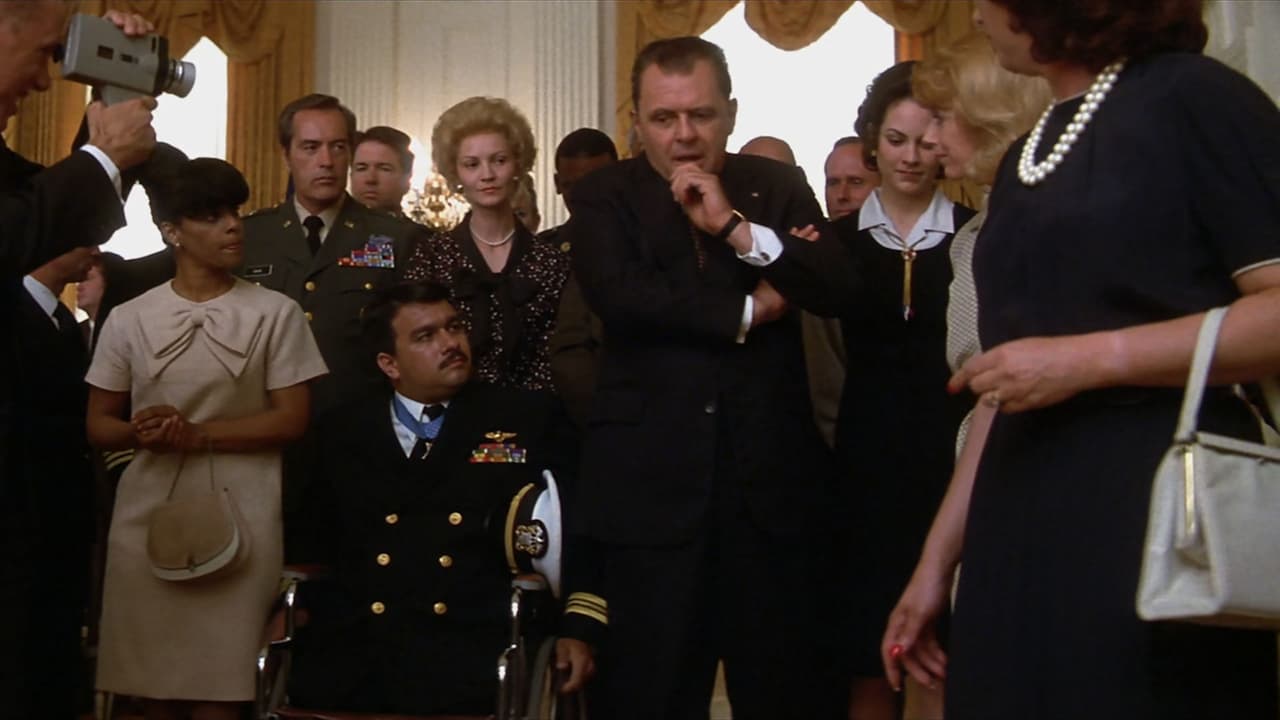ManiakJiggy
This is How Movies Should Be Made
Platicsco
Good story, Not enough for a whole film
Solidrariol
Am I Missing Something?
Bob
This is one of the best movies I’ve seen in a very long time. You have to go and see this on the big screen.
Kirpianuscus
realistic. direct. giving not exactly the traits of a political man but one of the inspired views of power. because it is a story about power. simple. cruel, mix of fear and crumbs of selfishness. about a man reduced at himself. the roots of a fall. an image of America. a huge conspiracy for control. fragments of childhood. and Anthony Hopkins as the best choice for a role who seems be the mix of Shakespeare and Dostoievski dark heroes. and, sure, Oliver Stone. as a fascinating searcher of the truth. as author of a chronicle of America. a honest one. a chronicle like a large open window. and the waves of fresh air.
Matthew Kresal
(Note: This review is based on the 2008 Election Year Edition DVD)Oliver Stone's 1995 film Nixon is something of an oddity. Released on the back of Stone's success with JFK and Natural Born Killers, it was largely praised by critics yet was all but ignored by audiences. Nearly twenty years later, the film stands up though as one of Stone's best films and presents an intriguing portrait of one of the most controversial men to occupy the Oval Office: Richard Milhous Nixon.Anthony Hopkins performance as Nixon is the heart and soul of the film. While Hopkins may not have done Nixon's voice or bare the greatest resemblance to him, he is nevertheless compelling in the role. Hopkins does that by capturing the many varying and often contradictory qualities of Nixon as the film moves back and forth through time from 1960 to 1974 and the year's in-between. There are moments of introspection, moments where's purely unlikeable (such as the dinner scene between Nixon and Pat late in the film) and yet moments where he is all too human. What Hopkins and the film succeed in doing is making Nixon not a caricature, but a human being and the film ultimately works as a result.The rest of the cast is strong as well. Paul Sorvino makes for an excellent and utterly convincing Henry Kissinger and, like Hopkins, rises up the caricatures to create a full-fledged character. Joan Allen's performance from Pat Nixon is interesting to watch as the relationship between her and Nixon develops and leads to some of the film's best scenes (such as the aforementioned dinner scene). There are also strong performances from James Woods, J. T. Walsh, David Hyde Pierce, Powers Boothe, Bob Hoskins, Sam Waterston (who only appears in the director's cut and steals the show for the space of his lengthy scene as CIA director Richard Helms) and Mary Steenburgen amongst others in the large cast. Like Stone's JFK, the film works in large part due to the strength of its cast.The film's production values are strong well. The film's recreations of the Nixon White House are stunning both to look at it and in their historical accuracy. The production design also does fine work creating the various settings of the film ranging from where Nixon grew up to a TV studio where one of the 1960 television debates took place to Air Force One and the presidential yacht. There's also a sparse but well done score from John Williams which also incorporates some good source music, including quoting Williams' own score for JFK at one point. What doesn't work as well is a newsreel sequence set after Nixon's 1962 defeat when he ran for governor of California due to some crude and even laughable pasting of Hopkins face into archival images and footage but that it is just about forgivable in light of the rest of the film.Looking at the film itself, it's easy to see why it failed to find a larger audience. Nixon takes the leaps in time seen in JFK (which itself was arguably a murder mystery on a fundamental level) to new levels as the film begins on the brink of the infamous 1972 Watergate break in, jumps forward to November 1973 and then proceeds to engage in a series of flashbacks (often within another flashback) as well as leaping forwards in time as it heads to the Presidential resignation in August 1974. The film also takes on a surreal and, at times, hallucinatory air such as bomb's exploding behind Nixon during a visit to the Lincoln Memorial, an odd tunnel effect used during his pneumonia episode or his mother's ghost appearing during one scene. The results can be hard to follow at times but the result is a rewarding one if the viewer sticks with it.The reason is that the film, largely through its script and Hopkins' Nixon, presents a fascinating portrait of a man and his times. The film shows a man who was in many ways admirable yet could be distant, cocky, ruthless, self-pitying, and paranoid who seemed to always be unsure of himself. Ultimately, Nixon as a film is a tragedy, the story of a man who causes his own downfall as a result of letting his personal demons overrule his better nature. While the film has been criticized for its historical accuracy (though the extensive footnotes in the published screenplay goes a long way to refute that), it nevertheless presents a fascinating was and perhaps even truthful image of a man who rarely if ever showed his true face.Nixon then is an intriguing film filled with strong performances, strong production values and a script that paints a fascinating image of a controversial figure. Yet in the way it's told, it is a film that can be long winded, leaps around decades of history and can be oddly surreal at times. As a result, Oliver Stone has created a film that is every bit as complex as its subject matter and, quite possibly, made all the better for it.
LeonLouisRicci
The most alienating of Presidents Nixon did very little to be the Leader of America. He steadfastly and without hesitation, apology, or even a slight understanding of what was dividing the Country, was a classic egocentric. His way was the only way and the only way you were going to be a bona-fide Citizen of "His" Nation was to follow him or get out ("love it or leave it"...remember that?).That may be a tough and simplistic analysis of a complex Political Figure but it is in the opinion of many, True. The Film displays this as Fact and it is probably not too far off. Here we see a consistently troubled (even in pre-Watergate times and Childhood) Personality that was most likely doomed the minute he became dependent on the Public for success.This is a mesmerizing and dazzling Picture with all the Oliver Stone touches. The familiar Stylist flourishes with abandon and Pride as he presents a "Biography" ultra-dramatized for effect and intent. It sweeps like a vacuum and not a broom as it powerfully draws in and upon a large amount of unsettling History and Psychological diagnosis.Overall, it is compelling and interesting, riveting and revolting, as we watch a National Figure lose his soul, as quoted at the beginning of the Movie, and it is not a fun thing to observe. This is a forever dark and brooding affair much like the title "Character". For it seems, for the most part, Richard Nixon was more like a Characterization of a Person than a Person, both here on screen and in Real Life. The Human Nixon always seemed to be in noncompliance with the "Third-Person Nixon" that he liked to refer to. (the President states..."I would like to apologize for the murdered students at Kent State...but Nixon can't")
Armand
or only map of an existence. memorable performance of Hopkins. and a character who can be, in same time, Faus and Mephistofel. because the film is, in Stone manner, a trip in heart of evil. not the evil with E but the common evil, the basic basket with sins, the fight and fall against/ in the hole of fear and cruelty, cowardice, lies and law as minor line. it is more than a movie. it remains a mirror. because it is not only the story/a story about Nixon and his Gollum silhouette or an extraordinary show with impressive cast. it is a kind of documentary about a world, a way, a form of desire and hypocrisy without limits. in final, film about a poor man and his demons. and an experience. not easy. but precise as cold lesson.

